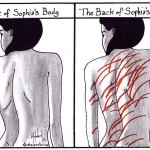 In Part One, we established that PTCS is a spiritual health condition that acts as a name, a frame of reference, common ground for shared experience, and a bridge. What else is Post-Traumatic Church Syndrome?
In Part One, we established that PTCS is a spiritual health condition that acts as a name, a frame of reference, common ground for shared experience, and a bridge. What else is Post-Traumatic Church Syndrome?
PTCS is a loss of gravity.
For those of us who, by choice or chance, placed God or religion as center of our personal universes, losing or leaving faith is akin to the sun ceasing to exist. The thing that exerted gravitational pull over our every decision, action, thought, and worldview; the thing that kept everything in balanced rotation; the thing that gave our lives rhythm and sequence and meaning and growth . . . it is simply gone. The physics of the world we knew no longer applies.
And when the apple falls upwards, it’s hard to know which way is down.
Loss of gravity is completely disorienting and may induce spiritual vomiting on innocent persons who accidentally engage you in conversation about spirituality. (A little-known catalyst for my own recovery was to survive a cocktail party without the urge to throw a drink in someone’s face.) If disoriented is where you are, allow me to offer my deepest congrapathies (congrats + sympathies).
Disorientation, though frightening, is a step in recovery.
“It’s important to remember that at first flush, going sane feels just like going crazy,” writes Julia Cameron* in The Artist’s Way.
You have to let go of what you know to find out what you believe.
PTCS is spiritual baggage.
Need I even comment here? Sigh.I personally had enough luggage to sink the Queen Mary II.
As if you didn’t have enough going on with the whole loss-of-gravity thing, you’re probably toting an awful lot of spiritual baggage. Backpack of guilt? Check! Carry-on of shame? Check. Steamer trunk filled with anger, disgust, sadness…? Triple-Check!
I’ve been there. Many of us have been there. Some of the baggage you’ll need to unpack in the healing process, and some of it you’ll need to shed. Don’t be afraid to let it go, lay it down.
Great freedom may be found in surrender.
PTCS is_________or __________and ___________ (fill in the blanks) (swearing allowed).
Language is powerful, defining or redefining terms for yourself an important step in healing. And if the current language you have doesn’t fit, make up your own. (This is why I use the term “Godiverse”.)
Since I can only define PTCS from my experience, I do not presume to cover what everyone out there feels: hence the fill-in-the-blanks above.
Most importantly, PTCS is an opportunity.
Sometimes opportunity knocks. Other times it knocks you out, and PTCS is known for throwing one mean sucker-punch.
The intersection of pain and opportunity comes when you’re down there on the ground: you have an entirely different viewpoint than you did when you were, say, riding your high horse or standing in judgment. (Wait…was that just me?)
Being knocked out can be like hitting a re-set button. The pain gives you permission to change beliefs that are no longer useful, theology that set you up for failure, and situations that create more darkness than light.
Post-Traumatic Church Syndrome is an opportunity to fight your way to the stronger person you will become.
Follow Reba on Facebook Join the PTCS community online Pre-Order Post-Traumatic Church Syndrome: A Memoir of Humor and Healing in 30 Religions by Reba Riley
*I will have the honor of interviewing the remarkable author, teacher, mentor, creativity expert, and artist Julia Cameron about spiritual healing in the coming weeks. Do you have a question you’d like to ask Julia? Please post it on my Facebook page with #AskJuliaCameron.











